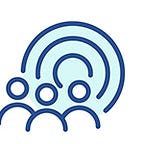Joana Varon, a Creative Chaos Catalyst
Joana Varon is the Founding Directress at Coding Rights. This story is built from a StoryEngine interview between Joana and Brett Gaylor, at the Refiguring the Future event in Chicago, May 2018. Read the full article.
I always envisioned myself as a researcher and activist, not as a media person. After someone referred to our work as media and I asked Dani, my program officer at Open Society about that, she said, “You’re doing media stuff.” I responded, “Yes, but it’s to translate research findings into advocacy because research outcomes normally tend to be presented in a boring and gray way that nobody pays attention.” She said, “This is media.”
It shaped also how we worked in Coding Rights. We already had successful feedback from our zine “SaferNudes“, that got translated to a few languages and got us touring to discuss it and facilitate feminist workshops to teach women to send safer nudes, including in an arts environment. Then “Chupadados” was being recognized as a media project. We were like, “OK, let’s assume that we are also a media organization and we produce visual things to spark change in views and behaviors,” I guess out of the need to involve more people in the privacy debate, and out of the joy to try to have fun in such a hard topic, we were doing something different then our partners in the field.
I want Coding Rights to become one of the several rocking actors, or actresses, of the feminist revolution and have fun and care for each other along the way. For doing that, maybe our main skills are to keep building tools, or reshaping tools, to help advocacy, either through media pieces, but also through community building.
For me what is wrong with the Internet is, so much surveillance, capitalism as the core internet business model, centralization, digital colonialism, polarization of views, and lots of hate… But let’s take freedom of expression, for example — it is going to be more and more controlled due to this whole discourse on fake news. I see that some companies and governments are taking a very paternalistic approach. Saying, “No, you should see that and should not see that.”
For me, it’s very dangerous to have others telling you what is fake or true. Taking the Internet Health analogy, what are the prescriptions? We shall not only just make the diagnosis because that’s just depressing…
It’s the same as environmental issues. People decide to leave the cities and go create their own communities. We should go and check the environmental movements. They have a lot of pessimistic diagnoses as well.
How do they cope with that? What are the strategies? What do they do with those pessimistic diagnoses? Can we learn some strategies, transpose them? Reinvent our interaction with digital technologies?
In the Internet, at least we have more control. The damage to the environment is way out of our hands in a way to recover things. With Internet, you can build another from scratch if you really wanted.
We have more goddess power to reshape things with technologies than to recover the mess humanity did with the environment. Unless our technologies for redressing environmental damage improve that much to be able to fix what we destroyed.
My alternative title at Coding Rights is Creative Chaos Catalyst… Chaos, you know, some of our magic emerges from that. So I’m like, “Let’s do this. This looks cool,” and then other questions, projects, goals, targets, money and measurements issues will follow from that instinct. I am kinda impulsive! There is a lot of fire in my astrological map
Go deeper:
- Full conversation between Joana and Brett
- CodingRights.org
- Chupadados
- @joana_varon on Twitter
- “We’re Watching Back” — blog post from Stories of Surveillance workshop at MIT
This content is © Mozilla.org and is distributed on the StoryEngine.io website under a Creative Commons Attribution license.
If you are interested in contributing to The Deep Listen or would like to talk to Loup, please reach out to us. We would love to hear from you!
